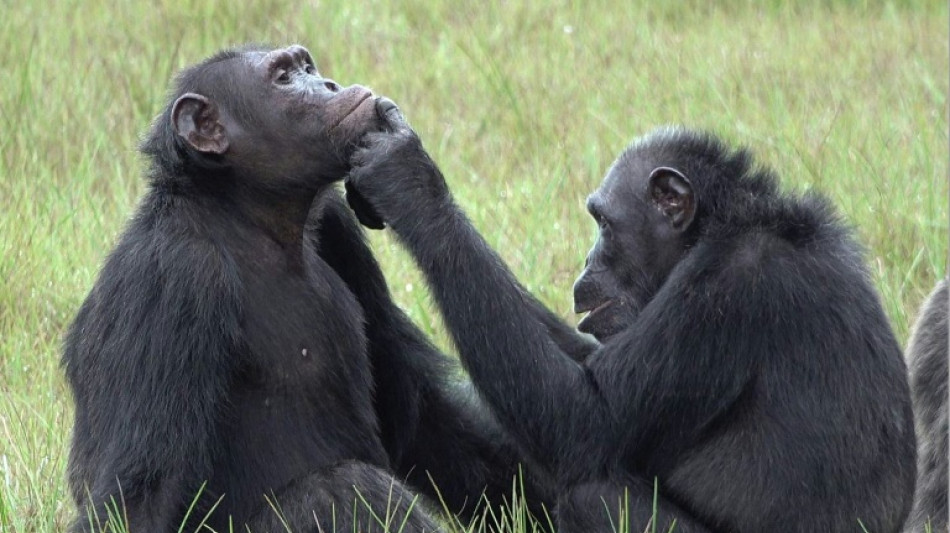
-
 Stock market optimism returns after tech selloff but Wall Street wobbles
Stock market optimism returns after tech selloff but Wall Street wobbles
-
Clarke warns Scotland fans over sky-high World Cup prices

-
 In Israel, Sydney attack casts shadow over Hanukkah
In Israel, Sydney attack casts shadow over Hanukkah
-
Son arrested after Rob Reiner and wife found dead: US media

-
 Athletes to stay in pop-up cabins in the woods at Winter Olympics
Athletes to stay in pop-up cabins in the woods at Winter Olympics
-
England seek their own Bradman in bid for historic Ashes comeback

-
 Decades after Bosman, football's transfer war rages on
Decades after Bosman, football's transfer war rages on
-
Ukraine hails 'real progress' in Zelensky's talks with US envoys

-
 Nobel winner Machado suffered vertebra fracture leaving Venezuela
Nobel winner Machado suffered vertebra fracture leaving Venezuela
-
Stock market optimism returns after tech sell-off

-
 Iran Nobel winner unwell after 'violent' arrest: supporters
Iran Nobel winner unwell after 'violent' arrest: supporters
-
Police suspect murder in deaths of Hollywood giant Rob Reiner and wife

-
 'Angry' Louvre workers' strike shuts out thousands of tourists
'Angry' Louvre workers' strike shuts out thousands of tourists
-
EU faces key summit on using Russian assets for Ukraine

-
 Maresca committed to Chelsea despite outburst
Maresca committed to Chelsea despite outburst
-
Trapped, starving and afraid in besieged Sudan city

-
 Showdown looms as EU-Mercosur deal nears finish line
Showdown looms as EU-Mercosur deal nears finish line
-
Messi mania peaks in India's pollution-hit capital

-
 Wales captains Morgan and Lake sign for Gloucester
Wales captains Morgan and Lake sign for Gloucester
-
Serbian minister indicted over Kushner-linked hotel plan

-
 Eurovision 2026 will feature 35 countries: organisers
Eurovision 2026 will feature 35 countries: organisers
-
Cambodia says Thailand bombs province home to Angkor temples

-
 US-Ukrainian talks resume in Berlin with territorial stakes unresolved
US-Ukrainian talks resume in Berlin with territorial stakes unresolved
-
Small firms join charge to boost Europe's weapon supplies

-
 Driver behind Liverpool football parade 'horror' warned of long jail term
Driver behind Liverpool football parade 'horror' warned of long jail term
-
German shipyard, rescued by the state, gets mega deal

-
 Flash flood kills dozens in Morocco town
Flash flood kills dozens in Morocco town
-
'We are angry': Louvre Museum closed as workers strike

-
 Australia to toughen gun laws as it mourns deadly Bondi attack
Australia to toughen gun laws as it mourns deadly Bondi attack
-
Stocks diverge ahead of central bank calls, US data

-
 Wales captain Morgan to join Gloucester
Wales captain Morgan to join Gloucester
-
UK pop star Cliff Richard reveals prostate cancer treatment

-
 Mariah Carey to headline Winter Olympics opening ceremony
Mariah Carey to headline Winter Olympics opening ceremony
-
Indonesia to revoke 22 forestry permits after deadly floods

-
 Louvre Museum closed as workers strike
Louvre Museum closed as workers strike
-
Spain fines Airbnb 64 mn euros for posting banned properties

-
 Japan's only two pandas to be sent back to China
Japan's only two pandas to be sent back to China
-
Zelensky, US envoys to push on with Ukraine talks in Berlin

-
 Australia to toughen gun laws after deadly Bondi shootings
Australia to toughen gun laws after deadly Bondi shootings
-
Lyon poised to bounce back after surprise Brisbane omission

-
 Australia defends record on antisemitism after Bondi Beach attack
Australia defends record on antisemitism after Bondi Beach attack
-
US police probe deaths of director Rob Reiner, wife as 'apparent homicide'

-
 'Terrified' Sydney man misidentified as Bondi shooter
'Terrified' Sydney man misidentified as Bondi shooter
-
Cambodia says Thai air strikes hit home province of heritage temples

-
 EU-Mercosur trade deal faces bumpy ride to finish line
EU-Mercosur trade deal faces bumpy ride to finish line
-
Inside the mind of Tolkien illustrator John Howe

-
 Mbeumo faces double Cameroon challenge at AFCON
Mbeumo faces double Cameroon challenge at AFCON
-
Tongue replaces Atkinson in only England change for third Ashes Test

-
 England's Brook vows to rein it in after 'shocking' Ashes shots
England's Brook vows to rein it in after 'shocking' Ashes shots
-
Bondi Beach gunmen had possible Islamic State links, says ABC

| RYCEF | 2.01% | 14.9 | $ | |
| RBGPF | -4.49% | 77.68 | $ | |
| CMSC | 0.02% | 23.305 | $ | |
| SCS | 0.12% | 16.14 | $ | |
| BCC | -1.23% | 75.58 | $ | |
| CMSD | 0.26% | 23.31 | $ | |
| GSK | 0.65% | 49.13 | $ | |
| NGG | 0.9% | 75.61 | $ | |
| RIO | -0.25% | 75.473 | $ | |
| BCE | 0.77% | 23.575 | $ | |
| AZN | 1.39% | 91.1 | $ | |
| JRI | 0.17% | 13.59 | $ | |
| RELX | 1.82% | 41.13 | $ | |
| VOD | 1.22% | 12.745 | $ | |
| BTI | 0.76% | 57.535 | $ | |
| BP | -0.38% | 35.125 | $ |

Treating wounds with insects: the strange habits of Gabon chimps
How to treat a wound?
For humans, the first instinct would be to disinfect it and then cover it with a bandage.
But chimpanzees have invented a more creative method: catching insects and applying them directly to the open wound.
Scientists observed this behavior in chimpanzees in the West African nation of Gabon, noticing that the apes not only use insects to treat their own wounds, but also those of their peers.
The research, published Monday in the journal Current Biology, marks an important contribution to ongoing scientific debate about the ability of chimpanzees -- and of animals in general -- to selflessly help others.
"When you're going to school and you read in your biology books about the amazing things that animals can do," Simone Pika, a biologist at the University of Osnabruck in Germany and a co-author of the study, told AFP. "I think it could really be something like that that will end up in those books."
The project began in 2019, when an adult female chimpanzee named Suzee was observed inspecting a wound on the foot of her adolescent son.
Suzee then suddenly caught an insect out of the air, put it in her mouth, apparently squeezed it, and then applied it to her son's wound.
After extracting the insect from the wound, she applied it two more times.
The scene unfolded in Loango National Park on Gabon's Atlantic coast, where researchers are studying a group of 45 central chimpanzees, an endangered species.
Over the following 15 months, scientists saw chimpanzees administer the same treatment on themselves at least 19 times.
And on two other occasions they observed injured chimpanzees being treated in the same way by one or several fellow apes.
The wounds, sometimes several centimeters wide, can come from conflicts between members of same or an opposing group.
Far from protesting the treatment, the bruised chimpanzees were happy to be tended to.
"It takes lot of trust to put an insect in an open wound," said Pika. "They seem to understand that if you do this to me with this insect, then my wound gets better. It's amazing."
- Soothing properties? -
Researchers have not been able to identify what bug was used on the wounds, but they believe it to be a flying insect given the chimpanzees' rapid movement to catch it.
Pika says the insect could contain anti-inflammatory substances that have a soothing effect.
Insects are known to have various medical properties and researches will need to conduct more work to detect and study the insect in question.
Birds, bears, elephants and other animals have already been observed self-medicating, for example by eating plants.
But what is unique about chimpanzees is that they will treat not just themselves, but also help others.
Some scientists, however, still doubt the ability of animal species to exhibit prosocial behaviors, such as selflessly caring for others, Pika said.
But here the chimpanzees have nothing to gain, she stressed. So why do they do it?
In humans, prosocial behavior is generally linked to empathy.
Could the same feeling be at play in chimpanzees, Pika wondered.
"It is a hypothesis that we must study," she said.
A.Clark--AT



